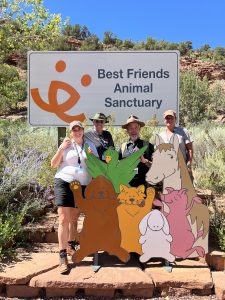“Our primary goal is to use fertility control more and have less poison in the environment.”
Communities typically have turned to poisoning rodents to address the problem, but this comes with unintended consequences, including the danger of poisoning people, wildlife or domestic animals, and the contamination of land and water.
WISDOM Good Works, co-founded last year by Dr. Mayer and Dr. Cheryl Dyer, has been attempting to shift the use of poison in the rat-control paradigm through the use of fertility-control technology.
WISDOM (Women in Science Doing Outreach and Mentoring) has pilot programs in Flagstaff, Boston, Utah, California and the Galapagos Islands to illustrate how GoodBites – its organic, plant-derived product – can dramatically reduce rodent infestations by making male and female mice and rats infertile.
“We believe humane animal population control is absolutely critical to achieving environmental balance,” said Mayer, who co-founded the non-profit last year with Dr. Cheryl Dyer. “Our primary goal is to use fertility control more and have less poison in the environment.”
WISDOM is funded primarily through grants and donations. It employs seven full- and part-time employees in Arizona and New York, has a five-member volunteer board, plus another seven volunteers who oversee pilot programs in California, Massachusetts and Utah.
Initially, WISDOM focused primarily on more isolated settings for its field tests, such as rural farms on Isabela Island in the Galapagos archipelago, where rats consume vital crops and also endanger endemic wildlife. This island work has also informed WISDOM’s assistance to the California Coastal Commission as it works to address invasive mice on the Farallon Islands.
Another ongoing project is eliminating mice infestations in the animal enclosures at the Best Friends Animal Sanctuary in Kanab, Utah.
As word spread, WISDOM heard from an urban residential area that wanted to shift from using poison to the GoodBites product to control its rising rat population.
More than 30 households within a two-block area in Boston’s Jamaica Plains neighborhood are participating in the study. Feeders with the GoodBites pellets have been placed in their yards.
Alaina Gonzalez-White, a former Flagstaff resident and WISDOM’s Northeast representative, is overseeing the Boston study. Each week, she documents the consumption in the feeders using WISDOM’s proprietary data portal and compiles reports about rat sightings in the area.
Her findings show that consumption of the GoodBites product from the feeders peaked in September, then declined as the population of rats was reduced through fertility-control technology. There was also a corresponding reduction in the number of rat sightings reported by residents.
“Based on previous studies in other areas, we are calculating that the population of rats in the neighborhood has steadily declined, from just over 600 in early September to about 350 in late December,” said Mayer.
This work caught the attention of the world’s largest pest management provider, Orkin.
“In our meetings with management at Orkin in Atlanta, we were told that coordinating a neighborhood of this size to participate ‘is most likely impossible,’ but that if we could, they wanted to learn more,” Mayer said. “We believe our success is demonstrating a remarkable value proposition that will drive our goal of eliminating poison from pest management.”
WISDOM is also sharing its information with the City of Boston and exploring potential ways of expanding the work in Jamaica Plains. Meanwhile, the Trustees of Reservations, a statewide non-profit organization with 57 community gardens in the Boston area, also launched a pilot program using GoodBites.
This year, WISDOM Good Works is set to launch its largest project to date, which will mostly be based in Northern Arizona.
Through funding from Open Philanthropy, a grantmaking organization based in San Francisco, WISDOM Good Works will conduct a rigorous pilot program to test its fertility-control technology all along the food pipeline – from fields to processing plants to storage and transportation facilities, and finally to consumers.
Mayer noted that when she worked with the Food and Agriculture Organization of the United Nations, she discovered that when wheat is shipped to other countries, up to 25% of the shipment can be lost to rodent infestation.
“Imagine if we could cut that amount in half; how many more people could we feed?” she asked, “Would we have the global food insecurity we face now?”
Ultimately, WISDOM Good Works hopes to transfer its technology to pest managers, manufacturers, distribution companies and other users in a variety of venues, so they can improve their bottom line while saving animals and the environment. QCBN
By Cindy May, QCBN
To learn more, visit wisdomgoodworks.org.
Courtesy Photo: Alaina Gonzalez-White and Dr. Loretta Mayer assessed rodent issues at Best Friends Animal Sanctuary in Kanab, Utah.






Leave a Reply